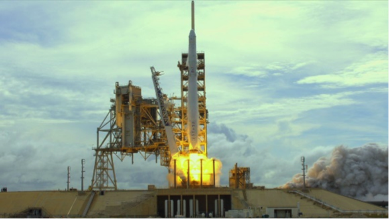UMD Experiments Launched into Orbit on SpaceX Capsule
On June 3, 2017, two University of Maryland experiments, led by researchers in the Department of Fire Protection Engineering (FPE), were launched into Earth’s orbit on a SpaceX Dragon capsule. The first experiment, called the Burning Rate Emulator (BRE), is focused on spacecraft fire protection. BRE uses gaseous fuels to determine the flammability of liquids and solids in microgravity. The BRE burners – flat, round and porous with embedded heat-flux sensors – will allow measurements of burning rate, extinction characteristics, and radiative environments for a broad range of solids and liquids. The tests are expected to reveal valuable information about how materials such as paper, plastic, and oil burn in microgravity. The second experiment is called Flame Design. Flame Design seeks to improve our understanding of soot – a major pollutant – and how it can be controlled in combustion processes. The project will be useful for designing flames that are both strong and soot free. The approach employed is relevant to oxy-combustion technologies, which are being developed for mitigating greenhouse gas emission from power plants through carbon capture and storage. In microgravity, the Flame Design burners produce spherical diffusion flames, which are unique in their simplicity. The microgravity environment experienced on the Space Station allows for controlled studies that are not possible on earth. The results of these experiments will offer further understanding of combustion, which will help to control pollutants in terrestrial combustion processes. "Access to microgravity has been a game changer in several areas of combustion research,” said FPE Professor and Co-Investigator Peter Sunderland. “By removing gravity, we can explore combustion physics in novel ways that will enable dramatic breakthroughs.” These experiments will be performed on the International Space Station in 2019 and 2020. They are part of NASA’s ACME suite of experiments that will be performed in the Combustion Integrated Rack. Additional project participants include FPE Professor Emeritus James Quintiere (PI), Akshit Markan (FPE PhD student), and Zhengyang Wang (FPE PhD student). For additional information, contact Peter Sunderland (pbs@umd.edu).
Related Articles: June 6, 2017 Prev Next |


